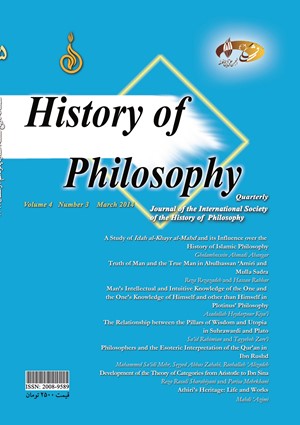Man’s Intellectual and Intuitive Knowledge of the One and the One’s Knowledge of Himself and other than Himself in Plotinus’ Philosophy
Subject Areas : Philosophical thoughts in ancient Iran
1 -
Keywords: Plotinus intellectual knowledge intuitive knowledge ineffability inexpressibility ,
Abstract :
The present paper explores whether, based on Plotinus’ view, man can have a demonstrative and inferential knowledge of the One. It also tries to provide answers to the questions of whether he can describe and explain Him, whether he is capable of having an intuitive and presential knowledge of the One, what kind of knowledge the One has of Himself, and, finally, whether this knowledge is of an intellectual demonstrative nature or of an intellectual-intuitive type. Plotinus believes that man is not capable of attaining a theoretical concept and intellectual-demonstrative knowledge of the One. Therefore, he cannot provide a description and explanation for Him. Nevertheless, he will be able to have intuitive knowledge and presential knowledge of the One under certain conditions. In this case, he will become one with the One in some way. Demonstrative thinking, which is concomitant with plurality in its essence, has no way into the essentially simple and pure One. Accordingly, He is intuitively self-conscious, and since He is the Origin of everything, and since everything is present in Him, He is aware of other than Himself in the same way that He is aware of Himself.
افلاطون، دوره آثار افلاطون، ترجمه محمدحسن لطفي، تهران، انتشارات خوارزمي، ج3، 1380.
افلوطين، دوره آثار فلوطين، ترجمه محمدحسن لطفي، تهران، انتشارات خوارزمي، ج1، و 2، 1366.
ارسطو، متافيزيك، ترجمه شرفالدين خراساني، تهران، نشر گفتار، 1367.
Proclus (1992), Elements of Theology, trans. E.R. Dodds, Oxford, Clarendon Press.
Nikulin, D. (1998), The One and Many in Plotinus, Hermes, 126. Bd. H. 3, pp. 326-340.
Wolfson, H.A. (1947), The Knowability and Describability of God in Plato and Aristotle, Harvard Studies in Classical Philology, vols. 56/57, pp. 233-249.
O’meara, D.J. (1995), Plotinus, An introduction to the Enneads, Oxford University Press. Gerson, L.P. (1998), Plotinus, Routledge, London and New York.
Armstrong, A.H. (1962), Plotinus, Collier Books, New York.
Guthrie, K.S., Numenius, The Father of Neo- Platonism, London, Gorge Bell And Sons.
Plotinus (1969), The Enneads, trans. S. Mackenna London, Faber and Faber Limited.
Plotinus, (1988), Plotinus,VII,EnneadsVI,6-9, trans. A.H. Armstrang, Harward Unversity Pres, London.
Hadot, P. (1988), Commentaire et Notes, in Plotin, Traité 38 (VI,7) , Les E’dtitions Du Cerf, Paris.
Bussanich. J. (2005), Plotinus’s Metaphysics of the One, The Cambridge Companion to Plotinus, edited by Gerson, L.P., Cambridge University Press.
Aristotle, (2011), Aristotle’s Nicomachean Ethics, trans. R. C. Brtlett and S.D. Collins, The University of Chicago Press, Chicago and London.


